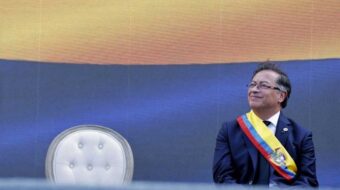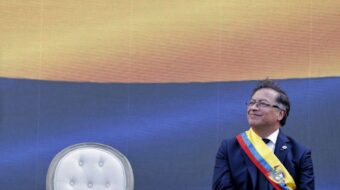Colombia’s Supreme Judicial Court issued a writ of prohibition on May 18 in the case of former Congressman Wilson Borja, ending investigation and potential prosecution on allegations he had connections with the leftist Revolutionary Armed Forces of Colombia (FARC). “After that decision,” former prosecutor Alfonso Gómez Méndez told AFP news, “the information from those computers can not be used in any other judicial proceeding.” He was referring to files contained in computers belonging to FARC leader Raul Reyes seized by the Colombian military on March 1, 2008, in Ecuador. The so-called “magical computers” withstood a Colombian air and ground attack that killed Reyes, other guerrillas, and visiting Mexican students.
Within months, dozens of government opponents, journalists, unionists, political leaders, and officeholders were being investigated, Borja included. They have been subjected to judicial hearings. Charges they face center on “rebellion” and association with terrorists, specifically leftist insurgencies. Uniformly, the victims have called for a political solution to armed conflict in Colombia. Many, like Borja, work with the left coalition Alternative Democratic Pole (POLO). In the midst of anti-terrorist frenzy, both Borja and peace movement leader Piedad Cordoba lost seats in the Congress and Senate respectively.
What observers refer to as a witch-hunt swept up TeleSUR journalist William Parra, Communist Party newspaper editor Carlos Lozano, POLO Senator Gloria Ramirez (already absolved through court action), and peace protagonist and former presidential candidate Álvaro Leyva Durán. Unionist Liliany Obando and academician Miguel Beltran ended up in jail. The computer revelations led to the Venezuelan and Ecuadorian governments being identified as FARC accomplices.
The Supreme Court based its ruling on the state’s inability to establish a judicially competent chain of custody for laptops remaining in military rather than law enforcement hands for three days after their seizure. In 2008, the International Police Organization INTERPOL reasoned similarly in discounting the reliability of the computer-generated evidence. The court made no reference to earlier testimony from Police Captain Ronald Coy that the computer files in question were word documents, not emails, thereby susceptible to manipulation, which Coy admitted to.
The FARC computer files have long held sway in the Colombian media. They allowed El Tiempo, for example, to report on April 25 that “the FARC ambassador in Europe” had arrived in Bogota. It was a reference to journalist Joaquin Perez Becerra, a Colombian-born Swedish citizen, who had arrived in Venezuela from Germany two days earlier. He was seized on order of Venezuela President Hugo Chavez at the request of Colombian President Juan Manuel Santos, who wanted him jailed.
In 1993, when Perez Becerra fled Colombia to save his life, he was serving as a city councilor in Valle del Cauca. He had won election as a candidate of the leftist Patriotic Union (UP) coalition whose members have been slaughtered, then and since, mostly by paramilitaries tolerated by the Colombian state. The toll so far is 5,000 deaths.
As the latest victim of persecution fueled by Raul Reyes’ computer files, Perez Becerra now has defenders worldwide, as indicated by Internet traffic, demonstrations on his behalf, and open letters. They invoke press freedom, because in Sweden Perez Becerra edited the leftist ANNCOL (News Agency for the New Colombia) website. They fear for his life because, having survived the UP massacre, he is again in the hands of the Colombian state. But, as reporter Dick Emanuelsson suggests, “If the decision of the Supreme Judicial Court takes effect, the Swedish journalist could soon fly off to Sweden to join up with family and friends.”
Meanwhile, Wilson Borja, vindicated, is planning to seek legal satisfaction from ex Attorney General Mario Iguarán, the Colombian state, and the media.












Comments